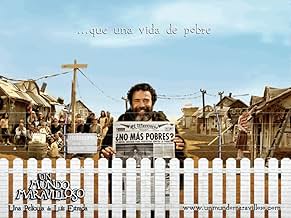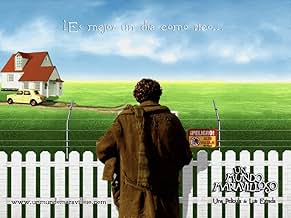IMDb RATING
6.8/10
1.7K
YOUR RATING
The minister of Economy gives a house, a car and job to a man who tried to jump from a building because of his poverty; soon, every poor tries the same strategy.The minister of Economy gives a house, a car and job to a man who tried to jump from a building because of his poverty; soon, every poor tries the same strategy.The minister of Economy gives a house, a car and job to a man who tried to jump from a building because of his poverty; soon, every poor tries the same strategy.
- Director
- Writers
- Stars
- Awards
- 11 wins & 3 nominations total
Pedro Armendáriz Jr.
- Director de 'El Mercurio'
- (as Pedro Armendáriz)
- Director
- Writers
- All cast & crew
- Production, box office & more at IMDbPro
Featured reviews
This movie was both funny and sad at the time. Leave it Demián Bichir to play a both goofy and sympathetic protagonist trying to make it in this cold world. Check it out for yourself.
I had really liked director's Luis Estrada dark political satire La Ley de Herodes and I was looking forward to this one. But A Wonderful World disappoints. It is a political satire/fable, and the premise is interesting. In a not too distant future, the Mexican Minister of Economy declares there is no more poverty in Mexico and plans to run for the leadership of the World Bank. However, a homeless drunk gets in his way. On paper, the movie should work like a charm. It's a very dark satire of the Mexican elite's indifference to the poor. But the execution is very flawed, even if the film boasts a veritable roster of some of the best Mexican acting talent around. This is what really bugged me: The rhythm is glacial. The plot meanders. And every scene is way too long. Every scene could have been cut in half and it would have still expressed its point, but Estrada loves the sound of characters cursing colorfully yet endlessly. He and his co-screenwriter, and the editor haven't apparently gotten yet William Shakespeare's memo that brevity is the soul of wit, and so it is with this film -- long and increasingly witless. Satire requires precise, surgical timing, economy of words and feelings and a coldish heart. None of this is in evidence here. There is a virulent strain of sentimentality coursing through this film's veins that really is unbearable. It's so bad that in scenes where the bum cries you can actually hear they added sniffles in post-production. So cheesy! There is a ridiculous, rather offensive love story, between the bum, played with great panache, and quite some hambone by Damián Alcázar, and a poor woman called Rosita, played by the unfathomably ubiquitous Cecilia Suárez. Now why is this offensive? 1. Because Cecilia Suarez is not believable as an impoverished inhabitant of a slum. She is tall and pretty and white as snow and and her attempts at sounding low class are absurd. I wonder if there are no other Mexican actresses available that don't look like they were born with a silver spoon in their mouths. She seems like she's trying to channel a silent film actress and the comic character of La Chilindrina, and she is not only insufferable but silly. Why could a poor woman not be anything other than a blathering, innocent imbecile? It is a disgraceful performance and no friend of anybody who is poor. 2. Because the Mexican rich and or middle class (and this includes the filmmakers) still think that the poor speak and behave like comic characters out of a 1940's movie. This may have been the intention, but it backfires, because instead of portraying them with some modicum of dignity, they are just corny stereotypes. Good hearted and innocent, to boot. This is patronizing. And patronizing is what the Mexican elites are and have always been to the poor. This is actually one of the points of the movie so it is rather maddening that this awareness didn't seep through to the way the poor are portrayed. The bum has a collection of bum friends (all great Mexican actors: Jose Carlos Ruiz, the great Jesús Ochoa and the great Silverio Palacios) and they are cool, but the direction as usual is as broad and unsubtle as if they were playing to the rafters in Azteca Stadium. 3. There is a sequence in a hospital which is a completely unnecessary, cheap, pathetic dig at Mexican Jews (which by the way, are like less than 1% of the general population). It's supposed to be a very fancy private hospital, called Sinai, and it seems like all the patients wear yarmulkes just so you don't miss the point that Jews are the only people in Mexico who can afford fancy hospitals, which of course is not true. An attempt at wit is to see signs for the spa and the golf course and the pool in the hospital's lush grounds. My heart froze when I saw this. It is amazing to me that screenwriters Estrada and Sampietro would write something so objectionable, so stereotypical, so inane and so uncalled for. 4. I can imagine what they were trying to achieve with the production design, which oscillates between the shiny modern Mexico and the slums, which are given a sepia, Fellinesque treatment, but even this seems pretentious and half baked. In short, a good idea terribly executed. Lazy and mediocre, written with more stupidity than wit.
One of the best Mexican movies that I have seen.A wonderful way to make fun of the government in Mexico.It is a typical Mexican way of making fun of our own tragedies. The work of Luis Estrada (one of the finest Mexican directors)had its first great hit with "La Ley of Herodes" another movie of criticism to the corruption of not only Mexican government but also of the U.S. For a Mexican citizen it is very relieving to see this kind of movie that expresses much of that we all have in mind, but don't get to say it. I really recommend it, and I hope this kind of movies are seen all over the world ,so that Estrada's work be fully recognized. He deserves it.
With regard to the comment entitled "Political propaganda by leftist artists" I'd like to point some things out. I saw this movie when it came out a few months ago in Mexico, where I had been studying all year. Like one of Estrada's first movies (La ley de Herodes), this one is also a severe political critique that attacks both the former PRI government (supposedly left wing) and the current PAN government (supposedly right wing). I think it should be noted, however, that while Fox's victory 6 years ago marked a BIG step towards political progress for Mexico, overall Mexicans are disappointed in the administration and the lack of significant changes that followed Fox's entrance into the office (not all entirely his fault, of course, given the left over PRI population that still has power in the government). And even though the PAN politicians might have cleaner hands than former PRI politicians, I don't think that the majority of the people in Mexico really distinguish between them that way. That is to say, I really think they just assume that all politicians, regardless of their party, are stealing money. Everyone I talked to while I was down there said they didn't have the slightest idea who they were going to vote for because all of the candidates were unappealing and untrustworthy, and it was all going to come down to the question, "Who's the lesser evil?"
So this leftist propaganda seems unlikely to me since López Obrador would be included in that category; even more so since he was originally a member of the PRI, and the PRD (his current party) is really just considered PRI #2, composed of unhappy PRI members who weren't being chosen for the positions they wanted. So, to sum all that up, the movie is critiquing Mexican politics in general and no party or politician is free from scrutiny here.
And finally, it's worth a rental if for no other reason than Damian Alcazar is absolutely wonderful!
So this leftist propaganda seems unlikely to me since López Obrador would be included in that category; even more so since he was originally a member of the PRI, and the PRD (his current party) is really just considered PRI #2, composed of unhappy PRI members who weren't being chosen for the positions they wanted. So, to sum all that up, the movie is critiquing Mexican politics in general and no party or politician is free from scrutiny here.
And finally, it's worth a rental if for no other reason than Damian Alcazar is absolutely wonderful!
A WONDERFUL WORLD (dir. Luis Estrada) A savage political satire that rashly promotes class warfare and advocates the violent redistribution of wealth within the context of an extremely bitter fairytale. A homeless man is trapped on a windowsill at the Mexican World Financial Center building, and although it appears to be a suicide attempt, it's not. The CEO of the WFC offers a bribe to get him to publicly acknowledge that draconian anti-poverty measures played no part in his decision to end it all. And, through a surreal turn of events, this leads the Mexican federal government to declare 'War On The Poor' rather than to continue the pointless and unwinnable 'War On Poverty'. The film is a bold and impetuous attack on fascist global policies, a complacent and corrupt Fourth Estate, and the 'filthy rich' (AKA 'job creators'). Kick Out The Jams Brothers And Sisters!!!
Did you know
- TriviaCharacter Pedro Lazcurain is named after a Mexican president who lasted only one day in the job.
- GoofsThe portrait that appears in the house of the politician Lascuraian, the Secretary of Economy of México, is, in fact, the portrait of Porfirio Díaz, president of México (1877-1911), and not from José Ives Limantour, Secretary of Economy of México in Diaz administration
- SoundtracksWhat a Wonderful World
Written by George David Weiss and Bob Thiele
Performed by Louis Armstrong
Courtesy of Universal Music México
- How long is Un mundo maravilloso?Powered by Alexa
Details
- Release date
- Country of origin
- Official site
- Language
- Also known as
- A Wonderful World
- Filming locations
- Metepec, Mexico(location)
- Production companies
- See more company credits at IMDbPro
- Runtime1 hour 58 minutes
- Color
- Sound mix
- Aspect ratio
- 1.85 : 1
Contribute to this page
Suggest an edit or add missing content
































